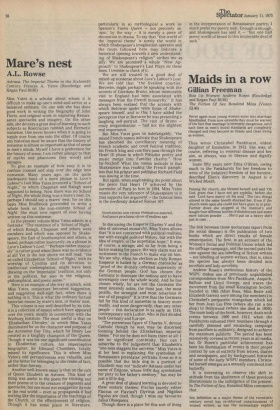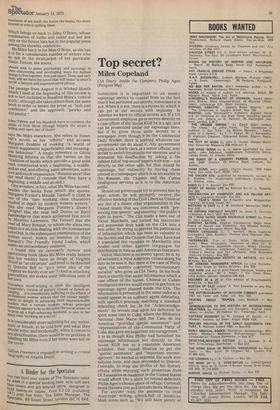Maids in a row
Gillian Freeman
Rise Up Women! Andrew Rosen (Routledge and Kegan Paul £6.95) The Fiction Of Sex Rosalind Miles (Vision £3.40)
Never again must young women enter into marriage blindfolded. From now onwards they must be warned of the fact that marriage is intensely dangerous, until such time as men's moral standards are completely changed and they become as chaste and clean living as women.
Thus wrote Christabel Pankhurst, eldest daughter of Emmeline, in 1913. She was, of course, referring to venereal disease and her aim, as always, was to liberate and dignify women.
Some fifty years later Edna O'Brien, owing much to the Pankhursts for her freedom to write of the (relative) freedom of her heroine, described Ellen's discovery in August is a Wicked Month.
Passing the church, she blessed herself and said 'Oh God, grant that I have not got syphilis,' before she said, 'Lord have mercy on his soul.' The two things uttered in the same breath shocked her. Even if the church were open she could not have gone in to pray. Further down she stopped at the chemist's and bought four different bottles of disinfectant and some more talcum powder .. . She'd put on a heavy skirt just in case ...
The link between these quotations (apart from the social disease) is the publication of two books which are direct results of female emancipation. The first, is an account of the Women's Social and Political Union which led the suffrage campaign, and the second puts the case against the sex-labelling of fiction writers — sex labelling of women-writers, that is, since the species has always been divided into novelists and lady-novelists.
Andrew Rosen's meticulous history of the WSPU makes use of previously unpublished correspondence from Mrs Pankhurst, Asquith, Balfour and Lloyd George, and traces the movement from the small Kensington Society founded in 1865 (Miss Buss, Miss Beale and Elizabeth Garrett were among the members) to Christabel's peripatetic evangelism which led her from Juan Les Pins (where she ran a tea shop) to Hollywood (where she died in 1958). The main body of the book, however, deals with events between 1900 and 1913, when the Pankhursts exhorted their members through a carefully planned and escalating campaign from pacifism to militancy, designed to achieve the maximum publicity. The period has been extensively covered in recent years in all media, but Dr Rosen's particular achievement has been his illumination of events in their proper context by use of extracts from letters, diaries and newspapers, and by background histories of some of the early WSPU members. Christabel herself emerges as a sexually continent iron butterfly.
It is interesting to observe the shift in attitude from the abstinence of these previous liberationists to the indulgence of the present. In The Fiction of Sex, Rosalind Miles comments that
Sex definition as a major theme of the twentiethcentury novel has re-inforced consciousness of women writers, as has the increasingly explicit treatment of sex itself; the hotter the beans, the more interest in who is spilling them.
Which brings us back to Edna O'Brien, whose combination of looks and talent put her not only on the fiction lists but in the popular press among the showbiz celebrities.
Ms Miles has it in for Miss O'Brien, as she has It in for a considerable number of writers who do not fit the straitjacket of her particular thesis. Fiction, she states, should seek to assist psychology and sociology in their discovering and developing ways for human beings to live together, free and equal. Then, and only then, will we have the novel that will make 'woman's novel' a fatuous and superannuated phrase.
The passage from August is a Wicked Month Which I used at the beginning of this review is not in fact included in Rosalind Miles's 'critical study', although she takes others from the same hook in order to berate the prose as "lush and overblown" and the approach "pawky and distasteful."
Edna O'Brien and Iris Murdoch have in common the strain of Irish blood (though happily the strain is telling only upon one of them)
says Ms Miles elsewhere. She refers to Susan Hill's novels as her "efforts" and accuses Margaret Drabble of evoking "a world of colour-supplement superficiality and meaningless behaviour." A single reference to Olivia Manning informs us that she carries on the "tradition of books which provide a good solid read, constructed with a beginning, a middle, and an end, and offering some adventure, some love and much reassurance." Reassurance? Has she read them? (I concede that they have a beginning, a middle and an end.) One wonders, in fact, what Ms Miles has read, besides the books from which she quotes. Margaret Forster's Maudie Tipstaff is cited as one of the "rare working class characters studied in depth by modern women writers." Has she read Margaret Forster's Dame's Delight? Has she read Nell Dunne or Beryl Bainbridge or that much acclaimed first novel by Maureen Lawrence, The Tunnel? Has she read all Mary Renault, to whom she allots two 'Pages in a section dealing with the homosexual novel but, in the subsequent examination of the lesbian novel, makes no mention of Mary Renault's The Friendly Young Ladies, which seems an extraordinary omission.
1 found this an extremely narrow and Patronising book (does Ms Miles really believe that her readers have an image of Virginia Woolf as "an old prune" and need to be directed ‘,to Quentin Bell to "give some idea of the virginia we hardly ever see"?) And in attacking generalities, she makes some ridiculous ones of her own.
Nowadays novel-writing is often the intelligent housewife's version of pottery classes or flower-arranging ... it is considerably belittling to the efforts of Professional women writers that the colour supplements so delight in informing their impressionable readers that a certain woman, whose principal function appears to be to decorate the social scene, or to prop up a high-achieving husband, is also in her sPare time 'working on a novel.'
It is considerably more belittling for any writer, Male or female, to be told how and what they should write, and incidentally, when it comes to sex identification, there would be no problem in labelling Ms Miles even if her name were not on the cover.
•
Gillian Freeman is engaged in writing a critical biOgraphy of Angela Brazil.



























 Previous page
Previous page